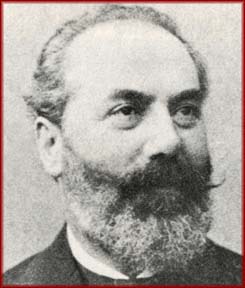




Sigmund Maybaum
Sigmund Maybaum was born in Miskolc on April 29, 1844. He studied at yeshivot in Eisenstadt and Presburg and at the theological seminary in Breslau. He was a rabbi in Alsó-Kubin, Hungary (1870-1873) and Saaz, Bohemia (1873-81) before becoming a congregational leader in Berlin (1881-1919).
Maybaum was an eminent preacher whose contemporaries described him as "one of the most eloquent rabbis of Germany."[1] He believed the old-style Shabbat drasha [interpretation of biblical text] should give way to morally uplifting sermons in the vernacular and that the giving of sermons was an art that could be taught. As a professor of homiletics at the Lehranstalt für die Wissenschaft des Judentums (the rabbinical seminary in Berlin), he "turned homiletics into a science."[2]
A founder of the rabbinical society of Germany, Maybaum served as its president and convened the first congress of German rabbis at Berlin in 1884. Three years later, when Theodore Herzl began to organize the first Zionist congress in Munich, Maybaum was a leader of the wave of protest from Germany’s Jewish community. He helped to promulgate and publicize a resolution that "the efforts of so-called Zionists to create a Jewish National State in Palestine [were] antagonistic to the messianic promises of Judaism"[3] and that Zionism both endangered the political status of Jews in Germany and would give rise to anti-Semitism. Herzl dubbed Maybaum and his colleague Heinemann Vogelstein "der protestrabbiner."[4]
Maybaum died in Berlin on July 31, 1919. His death was mourned as having "removed from our midst a man who as preacher, author, and scholar occupied a high rank in Israel." [5]
Credits: Text and page design copyrighted © 2008 by Helene Kenvin. Page created by Helene Kenvin. All rights reserved.